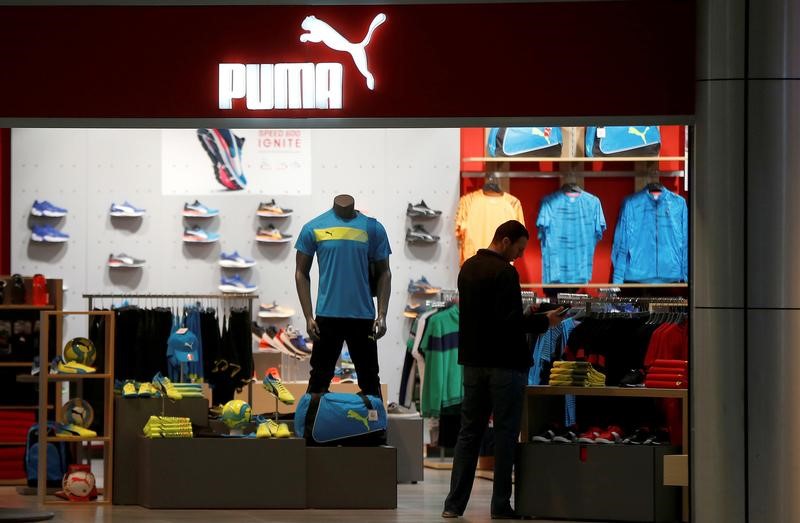By Emma Thomasson
BERLIN (Reuters) - German sportswear firm Puma (DE:PUMG) reported strong third-quarter profits on Thursday, due to tight cost controls, improved sourcing and higher prices, and said its full-year operating profit should come in at the top end of its expectations.
Installed by majority owner Kering (PA:PRTP) in 2013, Chief Executive Bjorn Gulden has led a gradual turnaround of a brand that had fallen out of favour, pushing it further behind market leaders Nike (N:NKE) and Adidas (DE:ADSGn).
Gulden has managed to revive sales growth, but improving profitability has been made more difficult by the strong U.S. dollar, the currency in which the sportswear industry sources most products in Asia.
In response, Gulden has sought to impose a strict control on costs, while increasing some prices and shifting more production to markets like Brazil, Mexico and Argentina.
Those efforts bore some fruit in the third quarter, with net profit almost doubling to 39.5 million euros (£34.71 million), beating average analyst forecasts for 33 million euros (£29 million).
It now expects its full-year earnings before interest and taxation (EBIT) to be in upper half of the range of 115 million to 125 million euros, reiterating a forecast for a high single-digit rise in currency-adjusted sales.
Puma's shares were up 1.4 percent by 0929 GMT, bringing their gains this year to almost 11 percent, outperforming a 1 percent rise for the German small-cap index (SDAXI).
Gulden said new products like Ignite Dual running shoes promoted by Olympic sprinter Usain Bolt and the Fenty fashion line designed by singer Rihanna were proving popular.
"More consumers are buying our products at full price and retailers are therefore more satisfied with us," he said, adding that products for women were selling particularly well.
Puma appointed Rihanna as women's creative director in 2014 as it seeks to tap into the "athleisure" trend of sports clothing being worn as a fashion statement, also partnering with top models like Cara Delevingne and Kylie Jenner.
Gulden shrugged off suggestions that slowing sales for both Nike and Under Armour Inc (N:UA) in North America might be a signal that "athleisure" might have peaked.
"We are coming from a low base. We are very, very happy with the development in the U.S. in the last eight to 10 weeks because our products are selling through. Our sales are not slowing down, more the opposite," he told reporters.
Rival Adidas last week gave a cautious outlook for 2017 after it reported its quarterly net profit rose 15 percent on sales up 14 percent and reiterated a forecast for 2016 currency-adjusted sales to grow at a percentage rate in the high teens.
